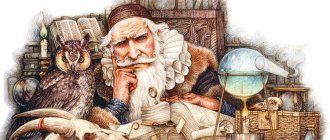The parable opens up a great deal of freedom to interpretation. She is more philosophical in nature. It is less clear compared to a fable. It can be much more complex in its semantic orientation, but simpler in form; Also, the parable does not always have a clearly identified plot. We can say that sometimes it is not there at all. This is what distinguishes “minimalistic” parables. However, many short parables have a plot, but in a condensed form, which allows the reader to focus as much as possible on the semantic subtext of the literary form, rather than on the filigree elaboration of characters or situations.
What does parable mean?
Παροιμία (translated from Greek as 'additional') was a short saying that expressed a life rule, wisdom in a concentrated form. Typically this Greek word was applied to biblical stories in the form of parables such as those of Solomon.
Another word Παραβολή already means a more voluminous composition in form, where situations from everyday life are taken as a basis, but through them high spiritual concepts are expressed in an allegorical way. Such works were primarily intended for ordinary people to facilitate their understanding of speculative concepts, and through the parabolic parable to make them accessible to perception. The parable, to some extent, “condescends” to the level of a reader unprepared for philosophical concepts.
Otherwise, the parable is also called a parabola, which is what the second definition, presented in Greek above, means. There are several hypotheses about the origin of the word. There are also associations with a figure, that is, a story as a “figure”. There are also direct indications that the structure of the literary genre of parable or parabola resembles the shape of a mathematical parabola. It begins as if from nowhere, from afar, then the narrative quickly comes to a critical point, where the key moment of the parable occurs, and then it returns to the motives from which it began.
The word “parabola” began to be used since the time of Aristotle, and in pre-Christian times its meaning was close to allegory and riddle. Many of the literary terms that we now share were perceived as one concept. A parabola meant such concepts as fable, proverb, aphorism, epigram. What united these concepts was the brevity of presentation or the inclusion of comparison in the internal structure of the composition.
Parable about the boss
The secretary, the manager and their boss were all going to lunch together. Unexpectedly, an old oil lamp was discovered along the way. Having rubbed it in an attempt to examine the drawing, they accidentally called the genie, who offered each of them to fulfill one wish. The secretary was the first to volunteer. “I want to be in the Bahamas, ride a speedboat there and not think about any worries!” No sooner said than done, the secretary took off to rest forever on the islands. “I wish I could be in Hawaii, relax in the company of a personal masseuse and have an endless supply of cocktails!” exclaimed the manager and also went on vacation. “Well, now it’s your turn,” the genie said to the boss. After thinking for a while, he replied: “Let these two slackers end up back in the office after lunch time.”
Morality:
Always let the boss speak first.
Parable "Black Dot"
An instructive parable about a parable about a black dot on a white sheet of paper
One day the sage gathered his students and showed them an ordinary piece of paper on which he drew a small black dot. He asked them: “What do you see?” Everyone answered in unison that it was a black dot. The answer was not correct. The sage said: “Don’t you see this white sheet of paper - it’s so huge, bigger than this black dot!” This is how it is in life - the first thing we see in people is something bad, although there is much more good. And only a few see the “white sheet of paper” right away.
East is a delicate matter
Most often, people are interested not in ordinary, but in Eastern parables about the meaning of life. This happens because it is in the East that there are a larger number of sages and masters, unlike other nations, which means that it is from there that full-fledged stories created by true masters of their craft flock. This is not always true, of course, since any author can call a parable “Oriental,” be it from London or Russia, but still, people often believe that they are reading an Eastern parable, which is why they automatically trust it more than other versions of similar stories.
Parable about dignity
One padishah sent the sage three identical bronze figurines and ordered him to say: “Let him decide which of the three people whose statues we are sending is worthy, who is so-so and who is low.” No one could find any difference between the three figurines. But the sage noticed holes in his ears. He took a thin flexible stick and stuck it into the ear of the first figurine. The stick came out through the mouth. The second figurine's wand came out through the other ear. The third figurine has a wand stuck somewhere inside. “A person who divulges everything he hears is certainly low,” the sage reasoned. - Anyone whose secret goes in one ear and comes out through the other is a so-so person. The truly noble one is the one who keeps all secrets within himself. This is what the sage decided and made corresponding inscriptions on all the figurines.
Instructive parables with morals about life
All the evil committed by a person remains with him, and the good given is returned to him
One poor woman in India baked a couple of flatbreads every morning. She left one for the family, and gave the second to a random passerby. She left the baked goods on the windowsill, and anyone could just come up and try the cake. Leaving the cake, the woman began to pray for her son, who left his father’s house in search of a new destiny. This went on for several months.
Soon she noticed that every morning a man with a hump came and took the cake from the windowsill. He often said to himself: “All the evil you do remains with you forever, but the good comes back threefold,” and left. The woman did not hear the slightest kind words. Offended by the hunchback, the poor woman decided to teach him a lesson. She poured poison into the second cake, wishing to get rid of the ungrateful guest forever. But as soon as she began to take the cake to the window, her hands began to tremble. She could not do this and threw the cake into the flame. Having prepared a new one, she took it to the windowsill. As usual, the hunchback came and, having said his words, continued on his way.
Soon there was a knock on the woman’s house, and her son was standing on the threshold. The guy was very thin and dirty. He told his mother that he almost reached home, but was so exhausted that he fell from exhaustion. A passing hunchback took pity on him and gave him a flatbread, and this helped the guy get home. Hearing this, the mother's heart trembled.
This parable is about goodness, which clearly shows the laws of nature. People who do good always receive good in return. And those who do evil are surrounded only by evil.
A short parable about good and evil - Two Wolves
Once upon a time, an old man revealed one vital truth to his grandson:
“There is a struggle in every person, very similar to the struggle of two wolves. One wolf represents evil: envy, jealousy, regret, selfishness, ambition, lies. The other wolf represents goodness: peace, love, hope, truth, kindness and loyalty. The grandson, touched to the depths of his soul by his grandfather’s words, thought for a moment, and then asked: “Which wolf wins in the end?”
The old man smiled and answered: “The wolf you feed always wins.”
Parable of Socrates “The Most Important Thing”
One day Socrates asked people:
— What is the most important thing in life? The people around him began to express their ideas on this issue. One of them said: “The most important thing in life is health.” Another said: “The most important thing is to have a well-built body, be attractive and be successful with women.” The third said: “The most important thing is to have money and position in society.” After everyone had spoken, they asked Socrates: “What do you think about this?” Socrates said: “I think that the most important thing in life is happiness!” Do you think that every person who has health will necessarily be happy in life? The people listening to him said: “No, Socrates, this is not necessary.” — Will a man who has a well-built body and is successful with women necessarily be happy in life? - No, Socrates! And this is not necessary, people answered. “Then tell me,” Socrates continued, “is a person who has a lot of money and position in society always happy?” “No, Socrates,” people answered, “rather, quite the opposite.” Such people are often lonely. —Which of the types of people listed here do you consider the most worthy? - Socrates continued to ask. — Imagine that you need advice from a doctor. Which doctor will you see? To a very rich, socially positioned, well-built, successful with women, or would you prefer a doctor who is happy in this life? All those present unanimously declared that they would seek advice from a doctor who is happy in life, because they recognize him as the most worthy. “Thus,” Socrates announced, “we all unanimously recognized that happiness is the highest good, and one should strive for it as the most important thing in this life.”
Instructive parables with morals about life
The art of not arguing A wise parable for children and teenagers
In one mountain village there lived a man known for never arguing with anyone. And then a correspondent came to him to write about him in the Guinness Book of Records. And the following conversation took place between them: “Tell me, is it true that you have lived for more than 90 years and never argued with anyone?” - Yes it's true. - Well, not with anyone at all, not with anyone? - Not with anyone at all, not with anyone! - And what, even with your own wife? - Even with my wife. - Even with your children? - Even with children. - And what, in 90 years, not a single time? - Not once. - Never, never with anyone, with anyone? — the correspondent continued, already heating up. “Well, yes,” the old man answered calmly. Correspondent (blushing and irritated): - It cannot be that you have never argued with anyone in your entire life! “I argued, I argued, I argued...” the old man answered conciliatoryly.
Parable about school
Goose went into the garden to see if everything was okay there. Lo and behold, someone is sitting on the cabbage.
- Who are you? - asks Goose.
- Caterpillar.
- Caterpillar? “And I’m Goose,” Gus was surprised and cackled. - That's great - Goose and Caterpillar
He cackled and flapped his wings, because he had never encountered such an interesting coincidence. And suddenly he fell silent.
- Why don’t you clap? - he asked almost offended.
“I have nothing,” explained the Caterpillar. - Look: you see - there is nothing.
-You don't have wings! - Gus guessed. - How do you fly in that case?
“But I don’t fly,” admitted the Caterpillar. - I'm just crawling.
“Yeah,” Goose recalled, “one born to crawl cannot fly.” It’s a pity, it’s a pity, especially since we are almost namesakes.
They were silent. Then Goose said:
- Do you want me to teach you to fly? It's not difficult at all, and if you have the ability, you'll learn quickly.
The caterpillar readily agreed. Classes started the next day.
- This is the earth, and this is the sky. If you crawl on the ground, then you are simply crawling, and if you are crawling in the sky, then you are no longer crawling, but flying.
That's what Goose said. He was strong in theory.
Someone's head poked out from under the cabbage:
- Can I do it too? I will sit quietly.
- Are you also a Caterpillar?
- No, I'm the Worm. But I would like to fly... - The worm hesitated and added, a little embarrassed: - This has been my dream since childhood.
“Okay,” agreed Goose. - Sit and listen carefully. So, we stopped at the sky...
They studied every day from morning until noon. Worm tried especially hard. He sat motionless and looked the teacher in the mouth, and in the evenings he diligently prepared his lessons and even repeated the material he had learned. Less than a month had passed before the Worm could accurately show where the sky was. The caterpillar was not so diligent. During lessons, she did God knows what: weaving a web and wrapping herself around herself until she turned from a living, mobile Caterpillar into some kind of wax doll.
“This won’t work for us,” Gus reprimanded her. “Now I see that you, Caterpillar, will never fly.” Once the Worm flies, I’m calm for him.
The worm diligently listened to the teacher here too. He was pleased that he was being praised, although he had no doubt before that he would fly: after all, he had straight A’s in all subjects.
And then one day, coming to class. The Goose caught the Worm alone.
-Where is the Caterpillar? - asked Goose. - Is she sick?
“She flew away,” said the Worm. - Look, look. Do you see?
The Goose looked where the Worm was pointing and saw a Butterfly. The worm insisted that it was the Caterpillar, only now it had grown wings. The butterfly fluttered easily in the air, and even Goose himself could not keep up with it, because although he was strong in theory, he was still a poultry.
“Well, okay,” Gus sighed, “let’s continue our studies.”
The worm looked intently at the teacher and prepared to listen.
“So,” said Goose, “what did we talk about yesterday?” It seems we stopped in the sky?..
Fight with Leo
The lion was resting in the shade of a large tree after a hearty lunch. It was midday. Heat. The Jackal approached the Lion. He looked at the resting Leo and timidly said:
- A lion! Let's fight!
But the answer was only silence.
The jackal began to speak louder:
- A lion! Let's fight! Let's have a battle in this clearing. You are against me!
Leo didn't pay any attention to him.
Then the Jackal threatened:
- Let's fight! Otherwise I’ll go and tell everyone that you, Leo, scared me terribly.
Leo yawned, stretched lazily and said:
- And who will believe you? Just think! Even if someone condemns me for cowardice, it is still much more pleasant than the fact that they will despise me. Despised for fighting with some Jackal...
Parable of Discontent
One day a man came to the Sage and began to complain about his life. It didn't work out for him - he didn't have the right height or face; you couldn't say he was very smart. And besides, he doesn’t know how to do a lot of things. For a long time the sage listened to his lamentations. And then he took him in his hand and led him out into the garden: “Look,” he said. - Here is a pine tree and an apple tree. Which of these trees is more beautiful and useful? – Is it really possible to compare them! People need them both and they are both good. – So why do you compare yourself with others and think that you are worse than them?! After all, every person, like a tree, is good and useful in his own way.
Interesting parables, or parabolas, in literature
The parabola, or “parable” in Russian, was popular in the 19th century, but became a separate genre somewhat later, in the 20th century, largely thanks to the works of F. Kafka and B. Brecht. From the short work that the parabola was considered to be, it began to look more like a major literary form. Golding's Lord of the Flies, Hemingway's The Old Man and the Sea, Orwell's Animal Farm and other works of the last century have added to the treasury of parable novels, in other words, parabolic novels.
However, interesting folklore parables are still the most popular. Folk wisdom carried through centuries will leave few people indifferent, and taking into account that the parabola is multi-layered, there are several levels in the subtext, which, moreover, can be interpreted in different ways. Sometimes you have to think for a long time about the question posed in a parabola, because everything is not as simple as it seems, and it can be very interesting to look at and re-read the same parable after some time in order to understand the hidden meaning that it carries.
If we turn to the folklore tradition, we will see a huge selection of parables of the peoples of the world: Western and Eastern, Greek, Indian, Christian and Sufi, ancient and modern. There are so many! This genre really did not go unnoticed, perhaps, by any people who had developed literary creativity.
Parable "The Donkey and the Well"
One day a donkey fell into a well and began to scream loudly, calling for help. The donkey's owner came running to his screams and threw up his hands - after all, it was impossible to get the donkey out of the well.
Then the owner reasoned like this: “My donkey is already old, and he doesn’t have much time left, but I still wanted to buy a new young donkey. This well has already completely dried up, and I have long wanted to fill it up and dig a new one. So why not kill two birds with one stone - I’ll fill up the old well and bury the donkey at the same time.”
Without thinking twice, he called his neighbors - everyone took up shovels and began throwing earth into the well. The donkey immediately understood what was happening and began to scream loudly, but the people did not pay attention to his screams and silently continued to throw earth into the well.
However, very soon the donkey fell silent. When the owner looked into the well, he saw the following picture - he shook off every piece of earth that fell on the donkey’s back and crushed it with his feet. After some time, to everyone's surprise, the donkey was at the top and jumped out of the well!
Instructive parables with morals about life
Example: “Life and Coffee”
One day, graduates of a prestigious college came to visit their wise professor, who had once taught them a lot. Gradually the conversation turned to life's difficulties, and then the teacher offered the guys coffee. After agreeing, the man left, and soon returned with a coffee pot and a tray filled with various cups. Some were beautiful and expensive, made of crystal or porcelain, others were simple and unsightly, plastic, cheap. “Look what you chose,” the professor began as each of his students took a cup. – You all took only the most beautiful and attractive cups, leaving the cheap ones on the tray. This is the source of your troubles - you strive to get the best for yourself. But the main thing is not what is outside, but what is inside. The taste of the coffee does not depend on the beauty of the cup, but it is your main goal. Think about it: coffee is our life, and money, society, work are just cups. We strive for the most beautiful cup, forgetting to fill it with its contents. But it serves only as a means to help support life. The main thing is coffee and its taste.
Parable “Nothing that would be untrue...”
One day, a blind man was sitting on the steps of a building with a hat near his feet and a sign that said, “I am blind, please help!” One man walked by and stopped. He saw a disabled man who only had a few coins in his hat. He threw him a couple of coins and wrote new words on the sign without his permission. He left it to the blind man and left. In the afternoon he returned and saw that the hat was full of coins and money. The blind man recognized him by his steps and asked if he was the man who copied the tablet. He also wanted to know what exactly he had written. He replied: “Nothing that would be untrue. I just wrote it a little differently." He smiled and left. The new sign read: “It’s spring, but I can’t see it.”
The world is a big mirror A wise parable for children
One day a student asked his teacher: “Teacher, does the world around us bring good or bad luck to a person?” “Let me tell you a story,” he said. A long time ago there lived a Shah, and he decided to build a castle full of wonders. And he made a hall in this castle, in which all the walls, floor and ceiling were covered with mirrors. And the walls there were arranged in such a way that if someone said out loud, “Who’s here?”, they would immediately hear “Who’s here?” “Who’s here?” “Who’s here?” One day a dog ran into the hall and froze in amazement in the middle - a whole pack of dogs surrounded it on all sides, above and below. The dog, just in case, bared its teeth; and all the reflections answered her in the same way. Seriously frightened, the dog barked desperately. The echo repeated her bark. The dog barked louder. Echo did not lag behind. The dog rushed back and forth, biting the air, its reflections also rushed around, clicking its teeth. The next morning, the servants found the unfortunate dog lifeless, surrounded by millions of reflections of dead dogs. There was no one in the hall who could cause her any harm. The dog died fighting his own reflections.” “Now you see,” finished the dervish, “the world brings neither good nor evil in itself.” He is indifferent to people. Everything that happens around us is just a reflection of our own thoughts, feelings, desires, and actions. The world is a big mirror...
Past, present or future?
Once upon a time, three wise men argued about what is more important for a person - the past, present or future. One of them said: “It is the past that makes a person who he is.” I learned all my skills in the past. - I don’t agree! - exclaimed another. - A person is shaped by the future: no matter what knowledge and skills I have today, I will acquire new ones - those that the future will require of me. My actions are dictated by the desire to become who I want to be. “You lost sight,” a third intervened, “that the past and future exist only in our thoughts.” The past is no more. There is no future yet. But any action is performed by you in the present and only in the present. And only today determines how you will enter the future and whether today will become the last point in your past. Don’t neglect today, on which so much depends!











